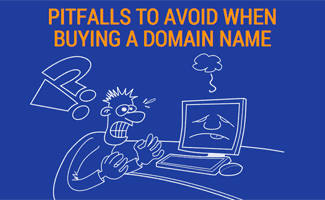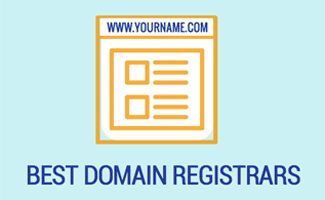When you purchase through links on our site, we may earn a commission. Here’s how it works.

The Keys To A Good Domain Name
The keys to a good domain name include the following:
- Short and/or easy to remember
- Easy to spell (and difficult to misspell)
- No hyphens (unless it’s absolutely necessary)
- Dot COM TLD or country specific domain extension
- Reflects your business, or the products or services you are selling
- Keyword focus for smaller businesses that don’t have large branding budgets
Let’s go through each of these elements in turn.
Short And Easy To Remember
You want your domain name to be short, so it doesn’t take users forever to type it into their browser’s address bar. And you want it to be easy to remember so they don’t accidentally land on the wrong site.
Easy To Spell
One of the banes of domain name selection is a catchy name that no one can spell. It might sound great and have an obvious spelling to you, because you’re familiar with the name or concept. There’s a couple ways of testing the “spell-ability” of your domain name:
- Open a spread sheet and type the name a couple dozen times as fast as you can. See if there’s a common misspelling that repeats itself. If so, and you’re stuck on getting this domain name, make sure you buy the misspelling and redirect it to your main site.
- Tell the domain name to a dozen or so people (without writing it down) and see how they end up spelling it
No Hyphens
This one depends on how you’re going to market your website. If you’re telling people about your domain name primarily via traditional marketing methods (phone, print, in person, etc.), you’ll want to avoid a hyphen in your domain name. Why? Because people don’t remember to add it. If you have to use a hyphen, make sure to emphasize the hyphen in all your marketing materials. And when you’re telling someone about your domain name, always emphasize the hyphen (ie. on a phone call for Fashion-Hound.com, you would say “Fashion HYPHEN Hound dot com.”)
If, on the other hand, you’re anticipating to do your marketing/ traffic gathering primarily via search, the hyphen isn’t as important. Why? Because most of your traffic will arrive via click-throughs, so people won’t have to actually type in the hyphen. The same goes for long domain names – if the primary traffic driver is search, the exact nature of your domain name becomes less of an issue. Still – if your site grows big enough, these factors will eventually come into play as you visitors are driven from a variety of traffic channels.
If you want to dive deeper into the “hyphen vs. no hyphen” discussion on domain names, feel free to check out our article dedicated to this topic: is my domain name better with or without hyphens?
.COM Or Country Specific Domain Name Extension
This is primarily important if you’re website or business is based in the United States. Why? Because most country specific domain names prefer their own country code (as do local searchers) to dot com. The only country coded domain extension that plays a lesser role to .com is .us (for the U.S.). That being said, .com is ubiquitous and accepted around the world as an authoritative, world-wide domain extension.
This also comes into play with the search engines. Google, for example, will give a “local” preference to domains with a particular country extension. That means if your domain name ends in .co.uk (for England), you’ll see targeted searches from visitors on that continent. If your domain name ends in .com, the nature of your website content will be more prevalent.
Lastly, with a .com (and with country coded extensions), you are more likely to get type-in traffic (traffic from users that simply type your domain name directly into their address bar). This type of traffic is most common for generic, dictionary-based words, which are becoming far less common and more difficult to get. Nevertheless, there are some keyword phrases out there receiving a good amount of type-in traffic to this day.
Let Your Domain Name Speak To Your Customer
It’s vital that your domain name be obvious to the customer. It should either contain keywords relevant to your business, or reflect your company name. Only if you have a large branding budget can you come up with a strange, quirky name and have people remember it. Of course, if you come up with a catchy keyword phrase (such as “Elephant in the Room”), people are more likely to remember that as well. Just to be sure, run a small focus group and see what people think. Mention the name over the course of a few days and then ask them again a few weeks later and see if they remember it.
Keyword Focus
We touched on this a bit in the last section, but we’ll say it again: for most small business startups, it’s not a bad idea to include keywords in your domain name that reflect what your business is all about. True, your domain name may be a bit boring and not as “fun” as a quirky, catchy name a creative agency may come up with. But to your customers – it won’t matter. If the name is easy to remember and makes it obvious as to what your business is about, that’s what counts. Learn more in our article Should You Have Keywords in Your Domain Name?
Choosing The Perfect Domain Name
Any luck choosing your domain name? Not sure if it’s still available? Visit Godaddy to search for a domain name for free.
Share Your Domain Name Experience
Please comment below with your experiences/ thoughts in the process of choosing your own domain name (or a domain name for your business), and include some of the domain names you’ve come up with (if they’re not confidential and assuming you’ve registered them if they’re important to you so someone else doesn’t grab them from in front of your nose!).
Choosing a domain name can be a fun but tiring process. Don’t close yourself in to a few days, but take your time, sleep on it, and don’t rush this part of bringing your business online. The more time you spend now choosing a good name, the less time you’ll waste down the road changing it and having to redirect all your indexed content (notifying the search engines that you’ve moved to another domain name, and putting the right commands in place to redirect your search traffic).
Tagged With: GoDaddy, Keywords

